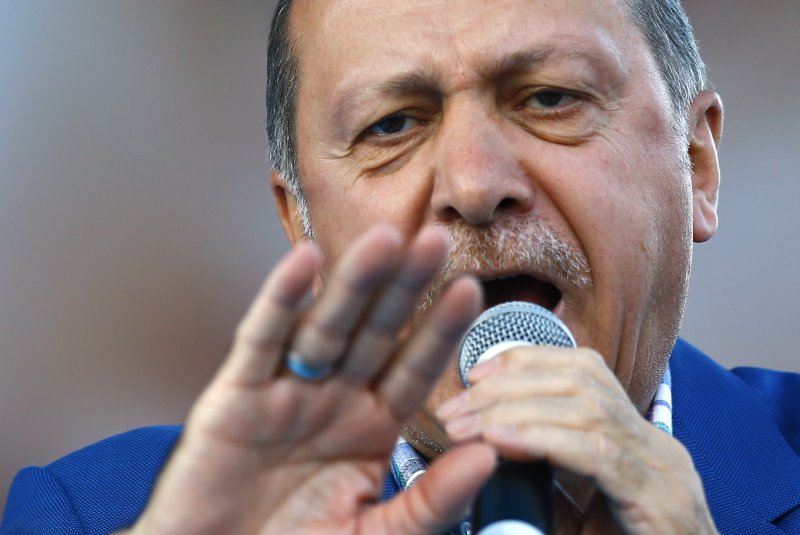Turkish President Recep Tayyip Erdogan's government has voiced frustration over what it sees as Washington's foot-dragging in response to its extradition request for a U.S.-based Turkish cleric blamed for last July's failed coup. File Photo by Sedat Suna/EPA
May 15 (UPI) -- Far from being a celebration of an alliance between their countries that dates back more than half a century, the first meeting between U.S. President Donald Trump and his Turkish counterpart, Recep Tayyip Erdogan, looks more like it will be an exercise in crisis management.
Erdogan, who is to meet with Trump during a visit Tuesday to Washington, is expected to express his anger at the U.S. president's decision to arm Kurdish fighters in Syria in preparation for an attack on Raqqa, the Syrian city serving as the capital of the Islamic State.
Turkey is accusing Washington of indirectly supporting terrorists, because a Kurdish militia playing a key role in the U.S.-backed Syrian Democratic Forces is seen by Ankara as an affiliate of Kurdish rebels fighting Ankara. Turkey's government has also voiced frustration over what it sees as Washington's foot-dragging in response to its extradition request for a U.S.-based Turkish cleric blamed for last July's failed coup.
The United States and Turkey have been NATO allies since 1952 and Turkey, which straddles the geostrategically important juncture between Europe and Asia, has served as a key base for the U.S. military. The U.S. military uses the Incirlik Air Base in southern Turkey for attacks on IS positions in neighboring Syria.
However, the strategic partnership between them has been strained by conflicting priorities in the Syrian war. Trump wants to see a quick and decisive military defeat of IS, a goal that makes the Syrian Kurdish People's Protection Units (YPG) a precious U.S. partner on the ground. The YPG is the main component of the SDF.
Ankara is concerned that the Syrian Kurds are plotting to create their own state in Syria along the Turkish border and says the YPG is the Syrian arm of the Kurdistan Workers' Party (PKK), a separatist rebel group that has been fighting the Turkish state since 1984.
The spat over Syria represents the deepest crisis in bilateral ties since Ankara denied Washington permission to deploy U.S. troops to attack Iraq from Turkish soil in 2003. Although the United States is keenly aware of Turkey's significance as a regional player and of the risk of closer Turkish cooperation with Russia, it shows no sign of backing down from the move to arm the YPG. Analysts doubt that Trump and Erdogan can come to an agreement during their talks at the White House.
"The question now is what the U.S. can do to limit the damage to its relations with Turkey and how far the Turks will go in demonstrating their displeasure," said Howard Eissenstat, an associate professor at S.t Lawrence University in New York.
It was unclear whether Erdogan would be mollified by U.S. offers to compensate for Ankara's acceptance of the YPG role in the battle for Raqqa. News reports said Washington could provide Turkey with better intelligence sharing to boost Ankara's fight against the PKK. Other reports said Trump could give Erdogan free rein for Turkish attacks against the PKK in Iraq.
In Turkey, opposition politicians and some media called on Erdogan to cancel his visit to the United States, increasing pressure on the Turkish president.
"Erdogan has very few cards to play," says Emre Uslu, a Turkish journalist who fled his country in 2014 and has been teaching at Virginia International University in Fairfax, Va., near Washington, D.C. Uslu said he expected Erdogan to present Trump with a plan for a Turkish role in the Raqqa area once the fighting there was over, to prevent a re-emergence of IS and to keep the Kurds from expanding their territory to the west of the Euphrates River.
Erdogan sent several senior officials, including his military and intelligence chiefs, to Washington for preparatory talks but the Turkish delegation failed to prevent the U.S. administration's decision to directly arm the YPG. Reports said Erdogan's aides were told by U.S. officials about the decision on May 8, one day before the move was made public.
Turkish Justice Minister Bekir Bozdag voiced disappointment about what Turkey sees as the U.S. reluctance to extradite Fethullah Gulen, a Pennsylvania-based cleric accused by Erdogan of being the mastermind of last year's coup attempt. Bozdag reportedly told U.S. Attorney General Jeff Sessions that Turkey would no longer respond to U.S. extradition requests if the administration regarded evidence against Gulen presented by Turkey as insufficient.
Turkish dissidents in the United States say they do not expect a breakthrough for Erdogan's extradition demand during his visit with Trump. The absence of credible evidence to back up Ankara's charge that Gulen was involved in the coup meant that the extradition process could not start, said Adem Yavuz Arslan, a Turkish journalist who fled to the United States in 2014. Arslan is portrayed by pro-Erdogan media in Turkey as a high-ranking Gulen follower, something he denies.
Even if Ankara could get U.S. courts to act, a quick decision in the Gulen case was unlikely, Arslan said via e-mail. The U.S. judicial system "will take years to arrive [at] any result given the fact that Gulen is protected under U.S. laws as a permanent legal resident," he said.
The article originally appeared at The Arab Weekly.















